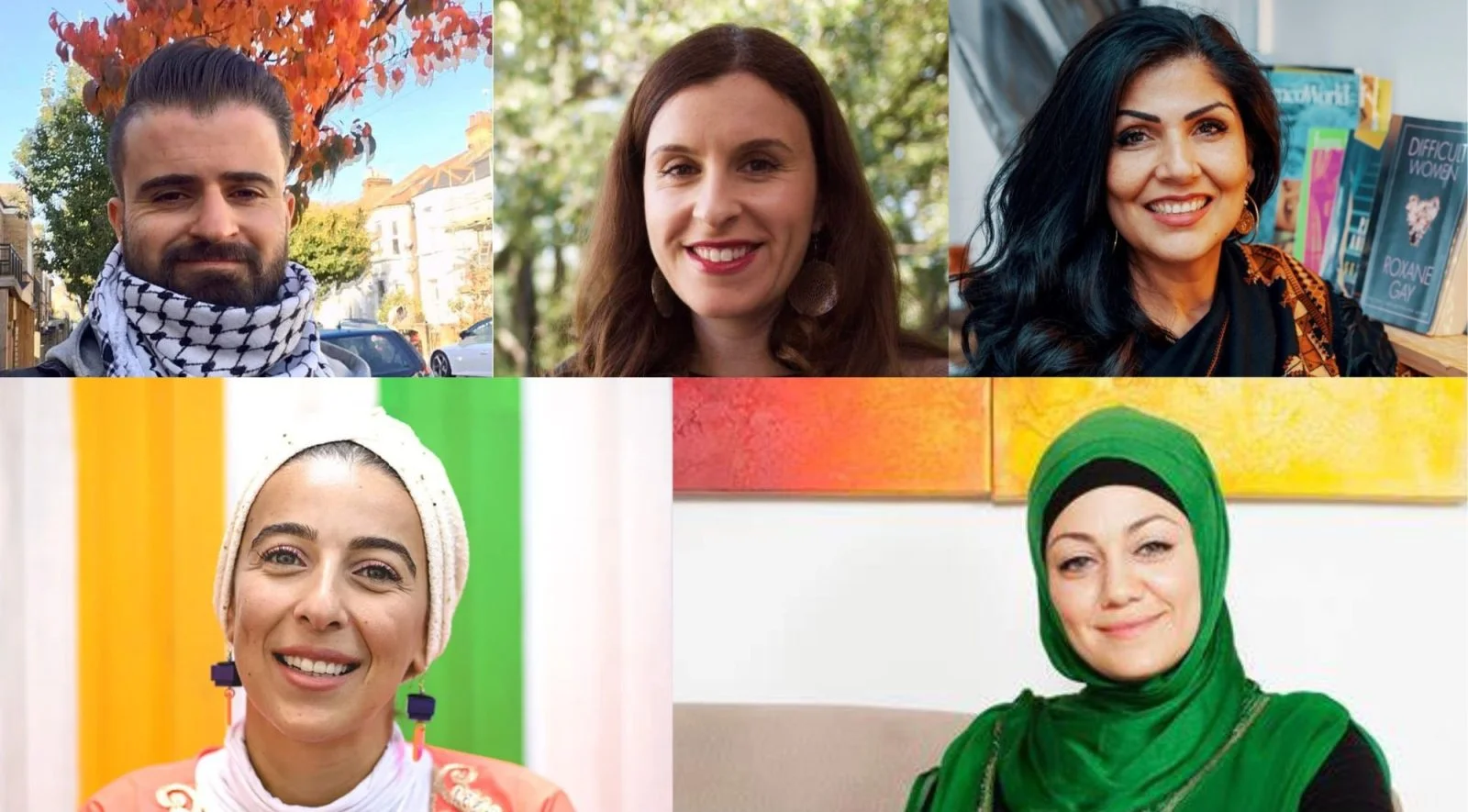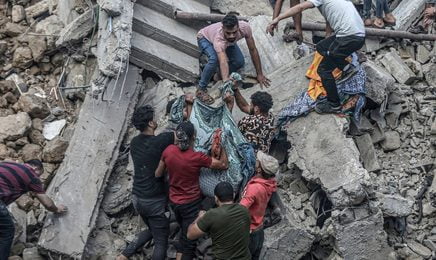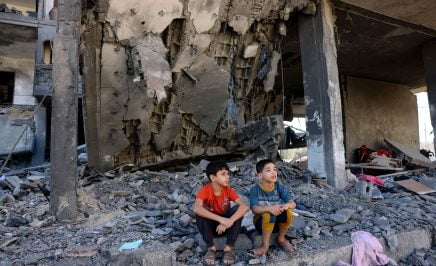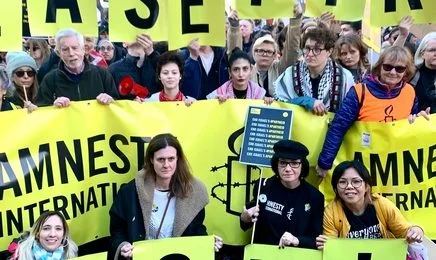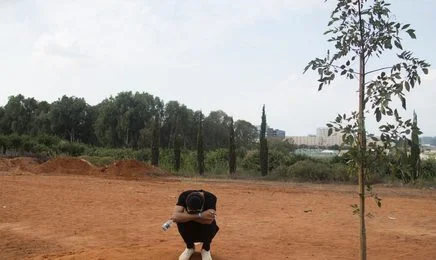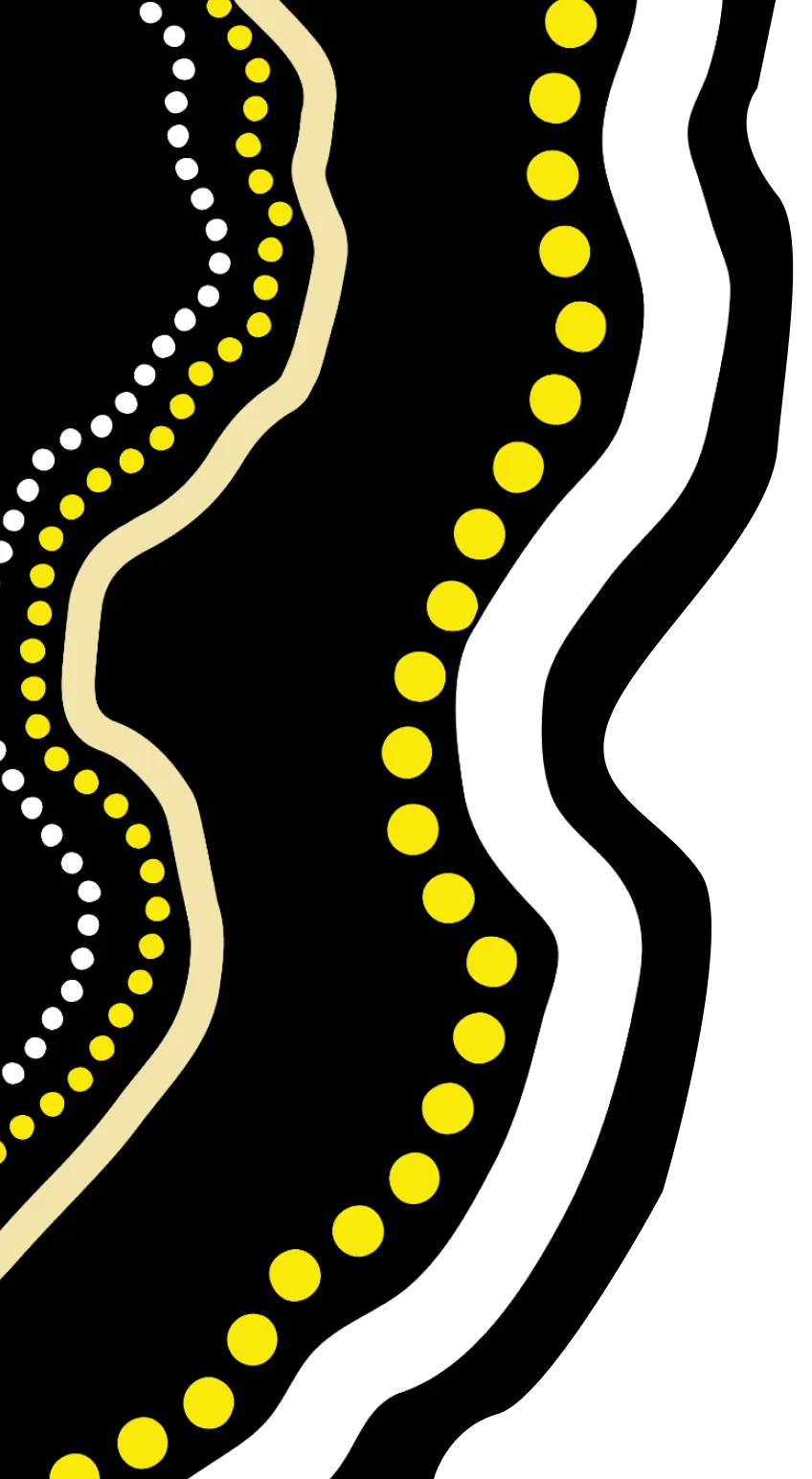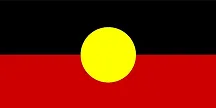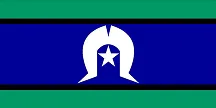Our blogs are written by Amnesty International staff, volunteers and other interested individuals to raise awareness and encourage action around human rights issues. They do not necessarily represent the views of Amnesty International.
Every year on 29 November, Amnesty International observes International Day of Solidarity with the Palestinian People. Palestinians have faced systematic oppression, displacement and violence since the beginning of Israeli occupation and apartheid over 70 years ago. But the period since 7 October 2023 has been one the most harrowing chapters in that recent history.
After seven weeks of horrific violence resulting in over 14,000 deaths, and with an all-too-brief ceasefire approaching its end, Palestinians living in Gaza are now facing the unimaginable prospect of even more devastation. These five Palestinian Australians generously and bravely shared with us their stories of grief, anger, solidarity and hope.
UPDATE 13 December, 2023: Backed by an overwhelming majority of member states, including Australia, the United Nations General Assembly has passed a resolution calling for a ceasefire. Amnesty International Australia welcomes Australia’s support for a ceasefire and holds out hope that this vote will also lead to the immediate, unimpeded delivery of humanitarian aid and the release of hostages. Now, our government must use every opportunity to continue to call for a ceasefire and for the Israeli Government to lift its 16-year illegal blockade on Gaza.
Five Palestinian-Australian Voices
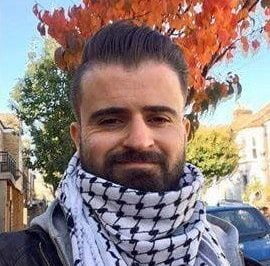
Elias Jahshan
Learn MoreElias Jahshan
I should not have to constantly audition for anyone’s empathy, just for them to see me as a human being.
Can you tell us a bit about yourself?
My name is Elias Jahshan. I was born and raised in Western Sydney, but I’ve been living in London for seven years. I’m the editor of This Arab is Queer, a nonfiction anthology of queer Arab writing.
Can you tell us how you’ve felt and how you’ve been impacted personally over the last few weeks?
It’s been an emotional roller coaster. The most prevalent feeling I’ve had is the feeling of helplessness. Especially when you see updates about the death toll or updates about indiscriminate bombings on hospitals, schools, mosques, churches, UN facilities. It’s just like, ‘Why do they hate us?’ And I think that feeling of helplessness is exacerbated when you see the West wilfully enabling [Israel’s military actions]. Just that sentence ‘Israel has a right to defend itself,’ is enough of a green light for all these war crimes to take place.
And I say it’s wrong to feel helpless, because there are ways you can help: protesting and calling your MP; spotlighting [Palestinian] voices on social media; doing what we can with the resources and privilege that we have.
I’ve felt angry a lot, as well. It’s hard to describe the anger. Usually, when I’m angry, I want to channel it somewhere. And there’s nothing for me to channel that anger to, other than my writing.
But I’ve found ways to constructively channel my anger. The best way to do it is to go to these protests. There’s something cathartic about yelling and screaming on the streets with hundreds of thousands of other people. It’s so energising. Whether they’re Palestinians or allies, it’s [about] that communal experience.
It’s been a real tough month. A lot of anger, a lot of helplessness. But at the same time, there have been some glimmers of joy in getting together with the community.
Do you have family in Gaza?
I have distant relatives in Gaza. All my ancestors come from Gaza, and I’ve got close cousins who live in East Jerusalem, and one of those cousins is in contact with the cousins in Gaza. He’s always checking up on them to make sure they’re okay.
They were all in that church that got bombed [Saint Porphyrius Greek Orthodox Church, partially destroyed by an Israeli air strike on 19 October]. Thankfully, none of my relatives were harmed. But that really struck home. It suddenly became more real.
My cousins in East Jerusalem say things are really tense for them now. It’s nowhere near as bad as the West Bank, but the administration is Jerusalem and the settlers are running rampant and have been given free guns by the right-wing nut job Itamar Ben Gvir. The Israeli military turns a blind eye to let the settlers do what they want.
There was a report we released last year that traced the current situation back to the foundation of the State of Israel, and it concluded that since then, it’s been an apartheid state. Why is all of that context and history important when we’re discussing what’s going on currently?
What Israeli authorities are doing to Palestinians is definitely a crime against humanity. It’s definitely apartheid. But I feel like apartheid is just the tip of the iceberg; there are so many forms of oppression.
We have to talk about [apartheid] all the time. If we don’t, then we’re playing into the narrative that everything that’s happening with Palestinians is happening in a vacuum, when it’s not. You’re talking about 75 years of apartheid, 75 years of occupation, 75 years of settler colonialism, land theft, ethnic cleansing, genocide. It’s been 75 years of things leading up to this.
Until we get rid of the root cause, violence is always going to be a natural symptom of it.
The constant zeroing in on Hamas is really frustrating. It reduces [Palestinians] to one group that supposedly represents all of us, when they don’t. It erases the diversity of Palestinians, [like] our political views, and our religiosity, as well. The way people equate Hamas to Palestinians is really dehumanising.
People constantly expect us to condemn Hamas. I reject that, because I should not have to constantly audition for anyone’s empathy, just for them to see me as a human being. I should not have to prove myself as a human by condemning Hamas to prove that I’m not antisemitic.
We have to look at the full context, because without that full context, Palestinians are always going to be dehumanised.
You mentioned before that you’ve attended some protests in London. There’s been a huge outpouring of solidarity from members of the public, if not from politicians. Why is that solidarity from around the world important, and why should people keep it up?
Solidarity is a super powerful thing. We saw that solidarity around the world when it came to pressuring for the end of the apartheid regime in South Africa, and it worked for South Africa. Seeing this huge movement gives me so much hope that people see the truth and that people understand that this is a racist, white supremacist regime that is out to oppress Palestinians for being Palestinians.
Do you have any message for the Australian government?
To be blunt, they should pull their finger out and just call for a ceasefire. It’s such a hypocritical thing that the most supposedly progressive government we’ve had in 10 years won’t do this simple, progressive thing of showing solidarity with Palestinians.
So I think Penny Wong, Anthony Albanese, you really need to understand that a ceasefire is the only way to go. It’s the first step and it’s the bare minimum.
Calling for a humanitarian pause is not enough to help Palestinian civilians living in Gaza, and you’re not going to free the hostages that way, either. I wish these politicians would stop saying, ‘We care about all lives…but.’ ‘But Israel has a right to defend itself.’ I wish they would wake up.
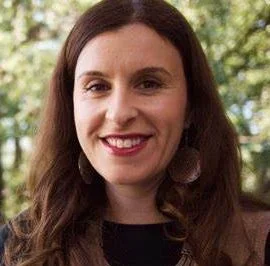
Randa Abdel-Fatah
Learn MoreRanda Abdel-Fatah
As we watch the genocide unfold every single day and the death toll rising, there is a feeling of not being able to breathe at times, not being able to function, not being able to continue our day.
Can you tell us a bit about yourself?
My name is Randa Abdel-Fatah. I’m a Palestinian-Egyptian Muslim. I work as an academic and am also an author of children’s books.
Can you tell us how you’ve personally felt and how you’ve been impacted over the last few weeks since this latest escalation in Gaza?
Since the seventh of October, I have felt my life has been on hold. I can’t function. We are all feeling vicarious trauma. And yet at the same time, there is absolutely nothing that will stop us from continuing our work to raise our voices to stop this genocide and to peel back, finally, the occupation and civil colonial regime that is Israel.
We are all feeling, as Palestinians in the diaspora, helpless as we watch our brothers and sisters being massacred.
There is a great deal of trauma, but there’s also a great deal of support. Holding each other, caring for each other. I am incredibly nourished by my Palestinian brothers and sisters and also by the solidarity that has come out in all communities and that has really galvanised us and helped us.
But as we watch the massacres and as we watch the genocide unfold every single day the death toll rising, there is a feeling of not being able to breathe at times, not being able to function, not being able to continue our day. Not being able to go to work, not being able to play, to be with our children. There is so much emotion at the moment.
Do you have any contact with anyone currently in Gaza or the West Bank?
I don’t have any contact directly with anybody there, but I’m in a circle of family and friends who do. There isn’t a day that goes past when there isn’t a WhatsApp message saying ‘I have lost this many family members, I’ve lost this many colleagues.’ So It all feels very close to home. There isn’t a single [Palestinian] family that I know in Australia who hasn’t been affected.
Amnesty released a report last year that found that Israel is an apartheid state and has been since its foundation in 1948. Amnesty considers the oppression of Palestinians to be a crime against humanity. Why is that context important when we’re discussing the current violence?
The historical context is absolutely key. The media and political analysis has focused on this as though it all started on the seventh of October, and what that does is immediately provide a racial framework in which only settlers and their suffering matters. That’s the only time the world will pay attention, as though 75 years of violence and occupation and civil colonialism don’t count.
Understanding why the Palestinians are resisting, understanding what provoked the attack – without that context, Palestinians are simply inherently violent terrorists. And that allows that framework to be imposed on a besieged population, on a population that has been suffering under a blockade for 16 years.
Unless the world is serious about understanding why this has happened and the context, then we are going to fall into the trap of pushing the [anti-Palestinian] propaganda [and the] idea that Palestinians are just using violence because, as the Israelis say, they’re ‘human animals’ and it allows that dehumanisation to be spread in all the analysis.
Why is it important then to condemn Israel’s treatment of Palestinians, both currently and historically?
It’s absolutely essential that we understand what this whole situation is about. It’s about an illegal colony that was imposed on a majority indigenous population. It’s about the fact that we’ve had a military occupation since 1967.
All of these circumstances – the siege on Gaza, the building of illegal settlements, the changing of the identity of Jerusalem, the settler violence, the constant home demolitions and collective punishment – these are all against international law and a stain on humanity. So it is absolutely essential that, when we look at what’s happening in the past three weeks, we understand the context and [ask ourselves] ‘How are we actually going to find a solution here?’
Something that has been great to see is this huge outpouring of solidarity around the world for Palestinians from members of the general public. Why is that solidarity important and why should people keep it up?
The solidarity has been the most incredible thing to bear witness to, to have millions of people on the street in support of Palestinians. And also to understand who is supporting Palestinians; it’s ordinary people.
Who is supporting Israel? It’s those in the corridors of power. It’s autocrats and dictators. It’s those who think that they’re democratic and progressive and yet refuse to even call for a ceasefire. So we are very, very confident that we are on the right side of history.
Why do you think those in power in the West don’t share that same solidarity?
I think that many people try to understand why Western powers are supporting Israel through a moral framework. But at the end of the day, this is about a military industrial complex. It’s about imperial interests and geopolitical alliances and what serves government interests. And until we can make Israel a bad investment for Western governments, they’re going to continue their support.
So that comes with boycotts and sanctions and divestment, because they’re never ever going to support us through a moral argument. Those alliances continue because Israel is big business. It exports its tools of repression: surveillance, arms. It is battle-testing, in Gaza and on Palestinians, these tools of oppression. We need to stop that in its tracks. And the only way we can do that is to build enough support on the ground.
What would you say to the Australian government?
To the Australian government, I would say that you were elected on a mandate that you were different to the Liberal Party. Instead, you are doing exactly the same thing as every autocratic dictator is doing around the world, and that is supporting a bloodthirsty apartheid settler colony. You need to call for a ceasefire. You need to hold Israel to account.
You need to reaffirm the importance of international law, and you need to prove to the Australian public that you are on the side of justice and that you will no longer aid and abet a genocide for which you will be exposed under international law.
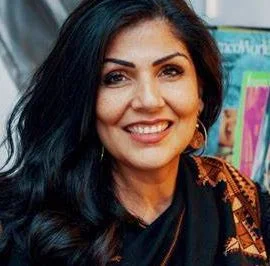
Samah Sabawi
Learn MoreSamah Sabawi
With time, these mobilisations across the globe for Palestinian rights will translate into political capital. It won’t happen overnight, but it will happen. And we will be free.
Can you tell us a bit about yourself?
I am a writer living in Naarm (Melbourne). I am originally from Gaza City in Palestine, which is currently facing a horrific genocide. I am here as a result of the original ethnic cleansing of Palestinians in 1948 and in 1967.
Can you tell us how you’ve felt and how you’ve personally been impacted over the last few weeks since this latest escalation?
It’s been very difficult to watch the news, to watch the discrepancy, actually, between the mainstream news and the stories we’re getting directly from people on the ground. And it’s been very frustrating and alienating for many Palestinians who live in Australia who do not see their voices being represented and do not see that enough dignity is given to their people for the mainstream media to call out what is actually happening in Gaza, which is genocide and war crimes.
Have you had any contact with anyone currently in Gaza or in other parts of Palestine?
We’ve had almost daily contact, except for the times when there was a blackout and we weren’t able to reach them. We use WhatsApp, mainly, and sometimes Messenger, to talk to our relatives. I have many relatives in Gaza, scattered all around. They were forced to leave their homes under the threat of being killed if they stayed behind [and the threat of] their homes being bombed.
The few cases in our extended family who were not able to leave – because they had an elderly person and there was no place to go to in the south and no safety, really, in the south either – they stayed in their home. And one family, three generations, were killed just a few days ago, in a targeted bombing of their home.
Amnesty considers that Israel is an apartheid state and has been since its foundation in 1948. We put out a report last year that concluded that the oppression of Palestinians constitutes a crime against humanity. Why is that context important when we’re discussing this current violence?
One of the frustrations I have with the media and with the reporters who have been calling us to give them stories, is that when they represent our stories or when they run quotes directly from Palestinian Australians, it always begins with “as a retaliation for the seventh of October attack…” And for Palestinians, this war has been going on for 75 years.
There are settlers taking over Palestinian homes and orchards and lands. The Israeli government has been revoking [residency or work] permits, and not only for the Palestinians in the West Bank. Palestinians with Israeli citizenship have been arrested. Forty of them were arrested in the last week for just posting things or sharing things on social media. Meanwhile, we have protests in Israel calling for ‘death to the Arabs,’ but the Palestinians in Israel are not allowed to protest.
Right now, the focus is on Gaza. But if you see it in context, and you see what’s happening everywhere, you understand that this really is ethnic cleansing.
Why is it important to condemn Israel’s treatment of Palestinians, not just currently, but also historically?
A condemnation is the beginning towards accountability. With lack of accountability and lack of pressure for Israel to comply with international humanitarian law, Israel can do what it pleases.
I’ll give you an example. In 2014, [during] the 50-day assault on Gaza, Israel ended that particular campaign by bombing high-rises. Lots of homes were destroyed. No one said anything. There was no accountability. And for them, this was testing the ground for the next time they go in.
So when they receive a green light saying, ‘Israel has a right to defend itself,’ when really, in international law, an occupying power does not have that right. Then, you know, we’re literally giving a green light to this genocide, and we are complicit in this genocide.
We’ve seen a huge outpouring of solidarity around the world for Palestinians from the public, though less from those in power. Why are these displays of solidarity important, and why should people keep it up?
They’re important because they tell the Palestinians around the world ‘Your lives matter as much as anyone else’s lives.’ It’s important because it inspires us and invigorates us to think that the political will that has enabled this genocide is not representative of the majority of people around the world.
And I believe that, with time, these mobilisations across the globe for Palestinian rights will translate into political capital. It won’t happen overnight, but it will happen. And we will be free. We will be.
Why don’t you think those in power, particularly in the West and in Australia, don’t share the same solidarity?
There’s a lot of history to that. It has to do with, in part, the Holocaust, and the fear of triggering antisemitism, which is a terrible thing. For some, as a result of the guilt [for the crimes] that were committed – not just by Germany, not just by Hitler, but really the entire Western world, [which] was treating the Jewish people in a way that is oppressive – there is the fear of that.
But there’s also political interest, and the fact that everyone ties their foreign policy in these countries to that of the United States of America. When the Prime Minister stands up and says, ‘We share equal values with Israel,’ to me, that is so frightening, because in Israel, they’re calling for death to the Arabs and calling for the annihilation of Gaza. What does it mean for me here as a Palestinian? Does my life not matter to this government?
But young generations, Jewish as well as Palestinian, are growing up with the feeling that ‘enough is enough.’ And I think the world will change because of this.
Do you have any message for the Australian government?
I would say to the Australian government that your position in supporting a genocide will not go unnoticed, that there will be accountability for this.
You have an obligation as heads of state, you have an obligation as the government in power, to comply with international humanitarian law and not to support war crimes. Call for a ceasefire now and then start to actually treat the Palestinian people at home and in Palestine as worthy of life.
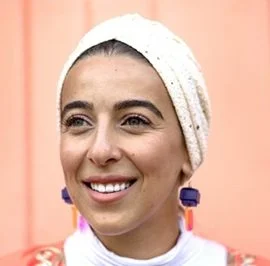
Sara Saleh
Learn MoreSara Saleh
Please do not give in to the fatigue. Please do not give in to the fear. Please keep getting in the way, because that is powerful. You have a role to play, and together, we are powerful. We’re making a difference.
Can you tell us a bit about yourself?
My name is Sara Saleh and I am a writer, organiser for social justice movements, and human-rights lawyer. I am the daughter of immigrants from Egypt, Lebanon, Palestine, and I am now based on stolen Bidjigal land.
Can you tell us how you’ve personally felt and how you’ve personally been impacted over the last few weeks since this latest escalation in Gaza?
I’ve been feeling angry, been feeling scared, been feeling overwhelmed, at times. But each and every single day, my resolve is renewed and strengthened when I look to Palestinians who are fighting on the front lines and when I see people of all backgrounds everywhere who are making such a critical impact in so many ways and who keep showing up for Palestine.
For me, that’s been the biggest thing. Together, I feel like we’re moving closer to freedom for Palestine and Palestinians. I just know it.
Have you had any contact with anyone currently in Gaza or the West Bank?
We have friends who are there. We have family who are there. We have Palestinian friends who are here in so-called Australia who are extremely worried about their family members there.
Obviously, the situation is beyond harrowing for Palestinians in Gaza at the moment. This is a genocide, and our friends in Gaza have asked us not to give up, not to stop calling for a ceasefire and not to rest until we dismantle these systems of oppression that they are being brutalised by.
The last message that I got from a friend who was there was for us to remember that they are not numbers, that they have a right to live free, like any human does. They have a right to travel, to study, to move, to go to the beach and have moments of joy without this chokehold of an illegal occupation that is strangling and punishing them.
And I really want to say that Palestinians in Gaza don’t need us. We need them. They are the ones who remain dignified and insist on life and insist on liberation even in the worst possible moments, even when they shouldn’t have to.
Amnesty considers that Israel is an apartheid state and has been since its foundation in 1948. We put out a report last year that concluded that the oppression of Palestinians constitutes a crime against humanity. Why is that context important when we’re discussing this current violence?
I think a lot of people think that this started on October the seventh, and I would hope that we are well past that false narrative at this point. Palestinians have been speaking out, have been writing, have been making films, have been marching, have been resisting. Palestinians have used every single medium that is available to us to speak out against the injustice of the occupation, against these ongoing atrocities and the apartheid regime that Israel has inflicted on us for 75-plus years.
The question is, ‘Why did the world just start to notice, just start to pay attention now?’ And unfortunately, the only conclusion that we’re left with is that Palestinian life seems to be not valued or not seen.
Palestinian activists are often asked to condemn Hamas before the conversation can really begin. Why is the inverse of that important? Why is it important for us to condemn Israel’s treatment of Palestinians, both currently and historically?
This might not be something that people are generally aware of, especially if they’re new to this and new to our movement – and, you know, there’s no time like the present. But I would say that Israeli lobby groups in so-called Australia and beyond have spent years and billions of dollars erasing Palestinian humanity – from your screens, your papers, your minds – carefully constructing this narrative. All for this moment. All for them to be able to have impunity as they continue to commit war crimes against Palestinians in Gaza and the West Bank and across that whole area.
Every parliamentary visit that they have offered politicians to Israel; every media junket they have taken journalists on to show them this whitewashed narrative; every headline that never afforded us, as Palestinians, context or innocence; Every movie, every TV show that portrayed us in the most racist way: all of that, every moment of digital suppression, all so we are at this point.
We’ve seen an outpouring of solidarity around the world for Palestinians, mostly from the general public and not from those in power. Why is this solidarity from the masses important, and why should people continue that?
I’m really moved and heartened and proud to see people, people who might not have been involved in any sort of activism before, following their gut instinct when they know that what they’re seeing is wrong.
We have obviously a front row seat to what is happening. But it takes a lot of internal reckoning from people to question themselves and decondition or deprogram themselves from what they have been taught because of those problematic narratives and myths that have been spreading for years and years.
It’s also important to acknowledge that there is a long history of solidarity with the Palestinian people, particularly from First Nations people, [including] communities across this continent. That has been one of the things that I’ve drawn strength from.
People around the world are engaged in struggle against these interconnected systems of white supremacy and colonial power and they understand how they impact us all in different ways. And in order to overcome them, we need to join together and fight together.
And importantly, at this point in time, after a month of the continual bombardment of Gaza, I would say to people: Please do not give in to the fatigue. Please do not give in to the fear. Please keep getting in the way because that is powerful. You have a role to play, and together, we are powerful. We’re making a difference.’
Why do you think those in power, particularly in the West, like here in Australia, don’t share that same solidarity with Palestinians?
There are plenty of reasons why. One key is that war and occupation are, quite simply, profitable. We’ve seen that many people in power, from the UK to the US and governments including our own, who have military and arms trade ties with Israel, continue to simply profit off of that.
What that says to me is that our tax dollars are directly tied up [in the conflict] and we also then are complicit and have a responsibility to [..] take action against that and to demand better from our governments.
What would you say to the Australian government, which has been reluctant to show any kind of solidarity with Palestinians in calling for a ceasefire?
What I would say to the Australian government is that the people in Gaza and across Palestine have spoken and their message is clear: we must call for a ceasefire. We must have a ceasefire and that must come with an end to Israel’s brutal siege and the occupation of Palestine.
I also say, ‘Listen to the people, who have shown that they stand with Palestinians unequivocally in our call to freedom.’ Sanction Israel. cut all economic and military ties. It’s time.
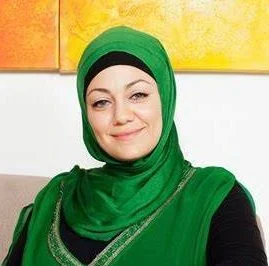
Arwa Abousamra
Learn MoreArwa Abousamra
What Israel is doing to these children is reducing them to body parts. It’s no longer ‘protecting itself’. This is about committing mass murder against children.
Can you tell us a bit about yourself?
My name is Arwa Abousamra and I am a Palestinian born in Saudi Arabia, and I’ve been living in Australia for the last 35 years. I’m a certified Arabic interpreter and I’m also a writer, and I’m very much a passionate cook. I love to cook Palestinian cuisine and preserve my heritage through that.
Can you tell us how you’ve personally felt and how you’ve been impacted over the last few weeks since this latest escalation in Gaza?
It’s been a horrifying experience. I think it sounds a little bit like a broken record when we talk about it from a Palestinian perspective; how do I compare this to the last atrocities that have happened in Gaza? But just watching it from a distance and feeling so helpless…It’s put me in a state of normal that I’m not familiar with.
As a mother, I’m devastated. I can’t even imagine what that would be like for somebody who’s experiencing that. But this new normal is a combination of rage and prayer, and not being able to sleep.
Have you had any contact with anyone currently in Gaza or the West Bank? And if so, what have you heard from them?
I don’t actually have contact with any family that’s in Gaza, I don’t have family there. But I consider them all my family. I’m watching people I know that have relatives there and are unable to contact them. Then they’re coming back with horrific news of entire families being decimated, of entire blocks – 100 people in one bombing – just completely wiped out.
We’ve had people doing work on our home, and we had one gentleman who’s a tradesman who […] put his phone blaring Al-jazeera news so that he could stay connected to anything that may be happening to his family in Khan Yunis. Watching him try to work as he’s listening to the news coming out of Gaza was devastating. How do you function with that?
Amnesty considers that Israel is an apartheid state and has been since its foundation in 1948. We put out a report last year that concluded that the oppression of Palestinians constitutes a crime against humanity. Why is that context important when we’re discussing this current violence?
It’s important because people shouldn’t see this as a separate incident that all started on the 7th of October. We are talking about 75-plus years of not only apartheid, but complete annihilation of the Palestinian people by the Israeli Zionist government.
The natural state of any human being is to want to be free and to push back against their oppressor. So when we see that push-back in some of the recent violence that has taken place, that is not isolated. It’s part of a bigger story that the world needs to understand.
Over the last few weeks, whenever a Palestinian spokesperson has stood in front of the media, they’re often asked to condemn the actions of Hamas and to distance themselves. But the reverse is rarely true; representatives or supporters of Israel are rarely asked to condemn the actions of their politicians. Why do you think it’s important to condemn Israel’s treatment of Palestinians?
I think condemning Israel has always been associated with antisemitism. But what you’re condemning is the actions of people who have absolutely no mercy in the actions they take upon the Palestinians.
If we’re looking at a regime that has no issue talking about children as animals and talking about human beings as animals, what does that tell you? What kind of mindset does that person have?
Today is UNICEF ‘s World Children’s Day. Since the seventh of October, which is just over a month, 5,550 plus children have been blown up. What Israel is doing to these children is reducing them to body parts. It’s no longer ‘protecting itself’. This is about committing mass murder against children.
If people are reluctant to condemn a regime that does this sort of thing, then there is something wrong with people. But for France to come out and distance itself, eventually, from Israel, which it previously showed unwavering support to, says something.
We’ve seen an outpouring of solidarity around the world for Palestinians, mostly from the general public and not from those in power. Why is this solidarity from the masses important, and why should people continue to be a part of that?
We’re seeing a shift in people’s understanding of their power. They’re coming together as part of that really important club; the human race.
I identify myself as a human being first, before anything else. We’re seeing people shed those aspects that [cause them to view themselves as] different from one another, and they’re seeing each other [instead] as human beings.
Something’s going to shift on an international scale. People are going to bond together, because their hunger for justice for one another is alive. Shifts in solidarity between people from different walks of life are so important, because they are the ones that will drive change.
Why do you think that those in power, particularly those in the West, don’t share that same solidarity?
This has been such a huge, eye-opening few years for politics in general, especially here in Australia, that people no longer have any trust. There’s no morality or credibility that emanates from any of the politicians that we have at the moment in positions of power.
When you have the Zionist lobby, with its hand in everybody’s pocket, that keeps driving this support from the top down, that means there’s something wrong with the structure and the systems that we trust.
When you have politicians that are bought and their opinions are bought, then there’s a decay that’s occurred within the systems. We need to call it out. And we need to do everything possible to push back.
What would you say to the Australian government, which has been reluctant to show any kind of solidarity with Palestinians in calling for a ceasefire?
I would probably direct this at any politician, locally or internationally: The entire world is watching you not even be concerned at something that is going to mark our humanity as one of the darkest days that we have seen. For you to be okay with genocide is not only a black dot next to your name, you have not only let down the people that you lead, but you have pretty much declared to everybody where your humanity stands.
People are the ones who drive change, not governments. Governments are then forced to bow down to that. We need to understand our power in this particular dialogue and maintain a consistent level of pressure, solidarity and mobilisation on every front.
You spoke earlier about your cooking being a sort of resistance. Could you explain what you meant by that?
As a young person being born in Saudi Arabia, feeling like I didn’t belong there…even as a child, you know. [I knew] it wasn’t my country, even though I could say we shared a religion and some parts of our culture.
I remember watching the news with my parents reporting on so many different moments in Palestinian resistance. There is an image of a man who was being brutalised by IDF soldiers that I just cannot unsee. Even now, as I speak – a 47-year-old – I cannot unsee that footage. And for me to ask the question ‘Why?’ is a journey of wanting to understand that umbilical feeling that you have to a place you’ve never seen.
I’ve never been to Palestine, but I still feel so deeply connected to it that it’s beyond my control. My parents were lucky enough to remember Palestine. My father would share with us so many stories, and it always involved oranges, because they used to own all these farms of oranges.
My mother, who almost educated us through cuisine, would cook for us these traditional, very authentic Palestinian dishes. And she would tell us the story behind it. How her mother taught her, how women in the village used to do this as a collective. And I would be able to taste my country through those cuisines.
As a mother, I cook these dishes for my children. I’ve delivered – and will continue to deliver when the opportunity arises again – classes that teach Palestinian cuisine. And for every person who walks through my door as a visitor, whether they’re from an Arab background or not, something on my table is always from Palestine.
